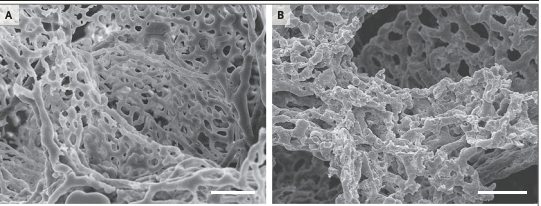The researchers studied how the network of pulmonary vessels was affected in COVID-19 patients. They compared these findings with the changes caused by a normal flu virus (influenza).
Damage to the smallest blood vessels
In the case of COVID-19 there were very clear and unique deviations of the pulmonary blood vessels. The smalles pulmonary veins (the capillaries) were severely damaged and contained many blood clots. The virus had also affected the walls of these vessels. A normal flu virus caused a lot less deviations in the pulmonary veins.

New blood vessels
The researchers also discovered that COVID-19 also caused the growth of numerous new blood vessels (angiogenesis). This became apparebt with the help of advanced imaging techniques and molecular research. In addition, COVID-19 appeared to cause a specific infection process in the lungs, different from that of any influenza virus.
Dr. Stijn Verleden (postdoctoral researchers in the BREATHE research group): "This research shows that the damage to the pulmonary veins played an important part in the respiratory failure and the unique clinical image (ARDS or acute respiratory distress syndrome) of COVID-19. This brings important new insights for the development of innovative therapies, specifically aimed at preventing or healing these vascular deviations."
International collaboration
The research is the result of a worldwide international collaboration of research groups in Germany (Hannover, Mainz), Belgium (Leuven), Switzerland (Basel) and the USA (Cambridge, Harvard). The respiratory diseases department and the thoracic surgery department of UZ Leuven and the KU Leuven research group BREATHE (Lab for Respiratory Diseases and Thoracic Surery) were closely involved in the research. The results of the trial were recently published in the renowned journal ‘The New England Journal Of Medicine’.
.jpg?style=W3sianBlZyI6eyJxdWFsaXR5Ijo3NX19LHsicmVzaXplIjp7ImZpdCI6Imluc2lkZSIsIndpZHRoIjoxMzIwLCJoZWlnaHQiOjgwMCwid2l0aG91dEVubGFyZ2VtZW50Ijp0cnVlfX1d&sign=0253d518bd162a411c187832497607a6df2607222449aafd791707acae6c9319)